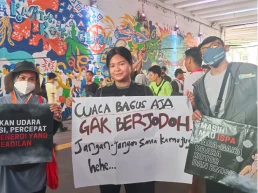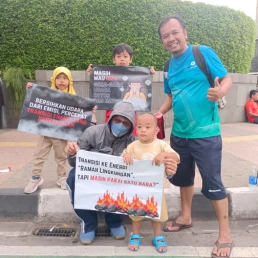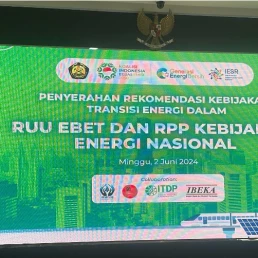Jakarta – On Sunday, June 2, 2024, the crowded Car Free Day (CFD) activities in the Sudirman-Thamrin area were enthusiastic and optimistic when the Emission-Free Indonesia Coalition organized the “2050 Emission-Free Indonesia March”. The march with the route from Kendal Tunnel to the Ministry of Energy and Mineral Resources (ESDM) attracted the participation of around 300 to 500 participants, including representatives of Publish What You Pay (PWYP) Indonesia, who were present to amplify their support for the vision of an Emission-Free Indonesia 2050. This activity is a meeting place for environmental activists and a critical moment to introduce and voice the issue of equitable energy transition and climate crisis.
Indonesia’s commitment to achieving Net Zero Emissions by 2060 or earlier and the endorsement of the Just Energy Transition Partnership (JETP) scheme through the Comprehensive Investment and Policy Plan (CIPP) last year are essential steps. However, some recent policies, such as the revised reduction in the renewable energy mix target in the Government Regulation Plan (RPP) on the National Energy Policy (KEN), which will update PP No. 79 of 2014, are a step backward in the commitment to an equitable energy transition. For example, the renewable energy mix target of 23% by 2025 is reduced to 17-19%, while the 2050 target of 31% is increased to 70-72% by 2060. These two revisions need to be criticized and monitored because the achievement of the energy mix is always below the target, including a blend of only 13.1% at the end of 2023.
In response to this phenomenon, various elements of society must voice their opinions and wishes. Renewable energy targets will directly impact the availability of energy essential for daily life. Demands for clean energy and an equitable transition process must be voiced, as the government regulates planning and realization.
The 2050 Emission-Free Indonesia march aims to introduce the issue of equitable energy transition and climate crisis, the development of energy transition in Indonesia in various sectors, and options for community involvement in the energy transition process. In addition, this activity also aims to voice demands for a more ambitious energy transition in Indonesia. The series of activities in this march include the march itself, providing policy recommendations to the Indonesian Ministry of Energy and Mineral Resources, poster competitions, and creative costume competitions.

The march was filled with diverse activities. What became a highlight was when participants provided policy recommendations to the Indonesian Ministry of Energy and Mineral Resources (KESDM). These recommendations resulted from in-depth discussions and thoughts from various elements of society involved in the energy transition. Additionally, to add to the event’s excitement, a poster competition and costume competition were also held. These competitions are expected to increase creativity and public awareness of environmental and energy issues.
Another goal of this event is to voice the demand for a more ambitious energy transition in Indonesia. The active involvement of various parties, including the government, private sector, and the general public, is needed to realize an Emission-Free Indonesia 2050. During this march, multiple platforms were introduced to strengthen the capacity of community elements. These platforms are designed to make it easier for communities to improve their understanding and skills in supporting emission reduction efforts. With these platforms, the community can more easily engage directly in various activities to reduce emissions and preserve the environment.
Pawai Indonesia Bebas Emisi 2050 is not just a walk together but a movement that brings together various elements of society in a joint effort to achieve a noble goal: a cleaner and emission-free Indonesia by 2050. The participation of PWYP Indonesia and various other aspects of society shows that collaboration and broad support are possible and necessary to create meaningful change. We hope more people will be aware and moved to play an active role in realizing Indonesia’s greener and more sustainable future. (EN)


